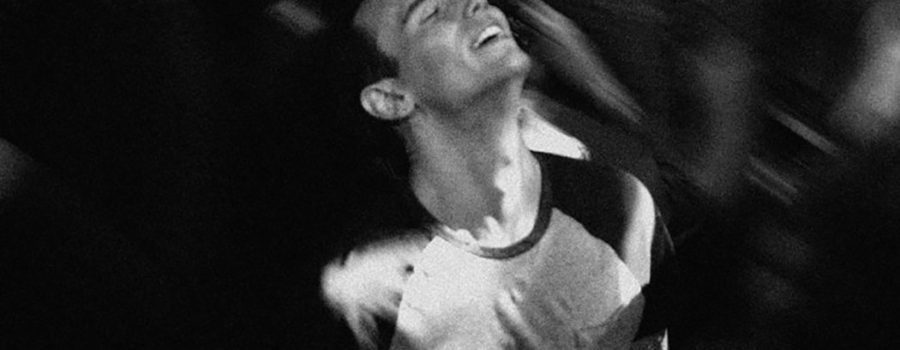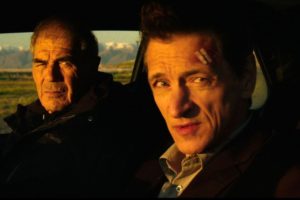[Published at Film Inquiry] 1985 is one of the finest new entires into LGBTQ cinema and one of the best films of the year. Yen Tan‘s latest feature, adapted from his 2016 short, is a dysfunctional family film set against the backdrop of the HIV/AIDS epidemic in the 1980s. Cory Michael Smith, most well-known for his role as Edward Nygma (The Riddler) on the television show Gotham, makes the leap from small to big screen seamlessly with a remarkable central performance. Smith plays Adrian, a closeted young gay man who leaves New York for the holidays to visit his conservative family for the first time in three years.
Premiering at South by Southwest Film Festival, and screening at Frameline Film Festival, 1985 is one of the few viewing experiences after which I was glad I saw it on my computer screen and not in a theater setting, as I obnoxiously cried in the film. I realize everyone is their own worst critic, but my loud sobs would have definitely ruined somebody else’s viewing experience. Tan beautifully captures the haunting mood of the period piece on 16mm black and white film. 1985 is a miracle of a film, one that pays tribute to an era, a generation past, and a culture that fueled the progress of LGBTQ civil rights for decades to come.
A Somber Black & White
Tan chose to shoot in black and white because, for one, many directors use it to accentuate a period piece or signify the past. He also chose Super 16mm black and white because the 1980s was such a colorful decade full of neons and bright, primary colors, and he and his cinematographer, HutcH, with whom he shares a story credit on 1985, didn’t want the viewer to think of a specific decade, per se.
“I think color can play a role in enhancing the nostalgic aspects of the 80s.” Tan told The Gate. “We didn’t want people to pay more attention to the random stuff in the background…We wanted people to focus on the actor’s faces and their body language, and we didn’t really want the viewer to look at anything else but them. Black and white was sort of the perfect way to zone us in on what we wanted to feel most specific.
“At the same time, it also feels timeless when you watch it. Yes, this is a period film, but there’s an immersive dramatic component to the colors of black and white, as well as the textural grain of film stock. We always saw it as a way of getting the audience fully into the story.”
It is said that, when you shoot on film as opposed to digital, you think more about the mise-en-scène ahead of time, such as the choreography, cinematography, lighting, costumes; it allows you to pay more attention to the set design, the feng shui of the props. You don’t take time for granted when you shoot with film because you have a limited amount of celluloid to shoot on, whereas, with digital, you’re always rolling, and you pay more attention to the mise-en-scène afterwards, typically.
Smith’s Stellar Turn Anchors A Superb Cast
Even having not seen Smith in anything else besides Gotham, I can still get an idea of his range through his performance on the show. Smith‘s go as The Riddler is so appropriately over-the-top; he effortlessly transitions from the more reserved Ed Nygma to the eccentric Riddler. Whereas, contrarily, his performance as Adrian in 1985 is exceptionally nuanced and grounded in realism. There is not one showy aspect of his turn. As Tan said, the viewer, by design, is solely focused on each actor’s face and body language, and one can notice that there is something significant brewing underneath the surface of Smith‘s.

source: Wolfe Releasing
Smith is matched by outstanding performances by Virginia Madsen as Adrian’s mother, Eileen, Michael Chiklisas his father, Dale, and Jamie Chung as his ex-girlfriend Carly. Chung and Madsen, especially, give exceptional, heartbreaking supporting performances, and Chiklis is always solid as the stern, tough-guy archetype with a soft side.
Why 1985?
It was the year of Nintendo, New Coke, Michael Jordan, The Breakfast Club, and Tears for Fears. It was also the year President Ronald Reagan mentioned AIDS publicly for the first time. It was the year Rock Hudson died of AIDS and the year the first commercial AIDS test became available. 1985 is based on a story Tan heard in his twenties in the 80s. Although it is commonly thought of as a nostalgic time for America, it was an unsettling, grim time for gay men. Tan explains that the AIDS epidemic is responsible for taking out nearly an entire generation of gay men. Many of the men that did survive worked as activists, but there was still a staggering amount lost to the disease.
“The New York Times came out recently with this thing a few weeks ago where they showed pictures of all these artists and designers who died of AIDS.” Tan said to The Gate. “When you look through that gallery, it’s staggering the cache of talent that we lost as a society, and you think about all the works we never got because they died. It’s mind-blowing all that we have missed out on, and the fact that so many people couldn’t continue with their work was such a huge loss.”

source: Wolfe Releasing
Tan said that many gay men in the subsequent generation after the AIDS epidemic, including him, had to figure things out on their own, and missed out on any kind of generational mentorship. Accordingly, Tan includes an emotional subplot between Adrian and his younger brother, Andrew (Aidan Langford), who is also gay, in 1985. Their dynamic represents this bridged gap between the generation of men lost to the AIDS epidemic and the generation after them. At the film’s most heartwarming is Adrian and Andrew’s relationship. Adrian encourages Andrew to continue to be who he is after learning that their father threw away his Madonna tapes. It’s the simple things like sneaking him into Nightmare on Elm Street 2, buying him R.E.M. tapes, or writing him a heartfelt letter that go a long way.
1985: A Must-See
1985 is absolute essential viewing. I recommend it to everyone of every race, color, religious creed, national origin, ancestry, sex, sexual orientation, or age. As I do with all of my films, of course, but with this one, especially. In this day and age, it’s wonderful to see a film shot on Super 16mm celluloid critically hold its own against the seasonal loud and large, digital summer blockbusters, especially one with 1985‘s themes.
1985 combines the expert decision of HutcH and Tan to shoot on black and white film with their mysterious and elegiac story and a star-making turn from Smith to make for an exquisite yet melancholic story about a dark time in history for gay men.
Have you seen Smith’s performance as The Riddler? Are you excited to see him branch out in 1985?
1985 screened at Frameline Film Festival on June 17, 2018 and Outfest Los Angeles on July 9, 2018. It is yet to secure a theatrical release date at this time. For more information, click here.
Opinions expressed in our articles are those of the authors and not of the Film Inquiry magazine.








Leave a Reply
Your email is safe with us.